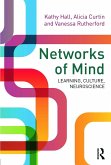This ground breaking book is unique in bringing together two perspectives on learning - sociocultural theory and neuroscience. Drawing on both perspectives, it foregrounds important developments in our understanding of what learning is, where and how learning occurs and what we can do to understand learning as an everyday process. Leading experts from both disciplines demonstrate how sociocultural ideas (such as the relevance of experience, opportunity to learn, environment, personal histories, meaning, participation, memory, and feelings of belonging) align with and reflect upon new understandings emerging from neuroscience concerning plasticity and neural networks. Among the themes critically examined are the following: Mind and brain Culture Ability and talent Success and failure Memory Language Emotion Aimed at and accessible to a broad audience and drawing on both schools of thought, Networks of Mind employs case studies, vignettes and real life examples to demonstrate that, though the language of sociocultural theory and that of neuroscience appear very different, ultimately the concepts of both perspectives align and converge around some key ideas. The book shows where both perspectives overlap, collide and diverge in their assumptions and understanding of fundamental aspects of human flourishing. It shows how neuroscience confirms some of the key messages already well established by sociocultural theory, specifically the importance of opportunity to learn. It also argues that the ascendency of neuroscience may result in the marginalization of sociocultural science, though the latter, it argues, has enormous explanatory power for understanding and promoting learning, and for understanding how learning is afforded and constrained.
Hinweis: Dieser Artikel kann nur an eine deutsche Lieferadresse ausgeliefert werden.
Hinweis: Dieser Artikel kann nur an eine deutsche Lieferadresse ausgeliefert werden.








